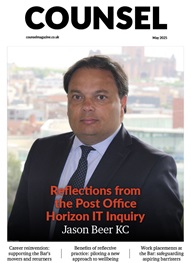*/
Lord Chief Justice
Increasing the number of women on the Bench is like “turning a tanker around”, the Lord Chief Justice has said.
Speaking at his annual press conference, at the end of September, Lord Judge said he was concerned about the lack of women and ethnic minority judges at senior levels but said he was restricted by the fact only 11 per cent of QCs and a quarter of law firm partners are women.
He rejected the notion of quotas to redress the balance, stating that “the only basis for appointment to the Bench must be on merit. I simply do not see how anybody can countenance the possibility of having quotas… Litigants expect their cases to be decided by the best quality people. I think it would be insulting to women – or to any minority – to say: ‘We are going to appoint you as part of a quota’.”
He warned there has been a “significant” increase in the number of self-represented litigants appearing in court, and that numbers are set to rise further from next April, when new restrictions on legal aid eligibility come into force.
Judges have to strike a “delicate balance” in such cases to ensure the self-represented litigant is “getting justice and doing justice to his own case” without upsetting the litigant who is represented into thinking “the judge has made up his mind against them”. This situation becomes more difficult where both sides are self-represented, he said.
“The cases take much longer and they are more difficult for the judge. The judge, contrary to some popular idea, does not know all the law… He needs to be shown where to find the law.”
Speaking at his annual press conference, at the end of September, Lord Judge said he was concerned about the lack of women and ethnic minority judges at senior levels but said he was restricted by the fact only 11 per cent of QCs and a quarter of law firm partners are women.
He rejected the notion of quotas to redress the balance, stating that “the only basis for appointment to the Bench must be on merit. I simply do not see how anybody can countenance the possibility of having quotas… Litigants expect their cases to be decided by the best quality people. I think it would be insulting to women – or to any minority – to say: ‘We are going to appoint you as part of a quota’.”
He warned there has been a “significant” increase in the number of self-represented litigants appearing in court, and that numbers are set to rise further from next April, when new restrictions on legal aid eligibility come into force.
Judges have to strike a “delicate balance” in such cases to ensure the self-represented litigant is “getting justice and doing justice to his own case” without upsetting the litigant who is represented into thinking “the judge has made up his mind against them”. This situation becomes more difficult where both sides are self-represented, he said.
“The cases take much longer and they are more difficult for the judge. The judge, contrary to some popular idea, does not know all the law… He needs to be shown where to find the law.”
Lord Chief Justice
Increasing the number of women on the Bench is like “turning a tanker around”, the Lord Chief Justice has said.


Please complete the Barristers’ Working Lives survey this month to help shape and prioritise the Bar Council’s work
AlphaBiolabs supports children’s Hospice with £500 donation
Rachel Davenport, Co-founder and Director at AlphaBiolabs, discusses the company’s commitment to giving back to communities across the UK
By Kem Kemal of Henry Dannell
By Nick Bonnello and Aaron Young of RWB Chartered Accountants
By Kem Kemal of Henry Dannell
Animal sexual abuse is a distressing and taboo subject. Yet, write Christina Warner and Maya Badham, this hidden crisis, where legal, ethical and psychological factors converge, requires frank discussion
A cultural life and times
Maria Scotland and Niamh Wilkie report from the Bar Council’s 2024 visit to the United Arab Emirates exploring practice development opportunities for the England and Wales family Bar
Marking Neurodiversity Week 2025, an anonymous barrister shares the revelations and emotions from a mid-career diagnosis with a view to encouraging others to find out more
David Wurtzel analyses the outcome of the 2024 silk competition and how it compares with previous years, revealing some striking trends and home truths for the profession